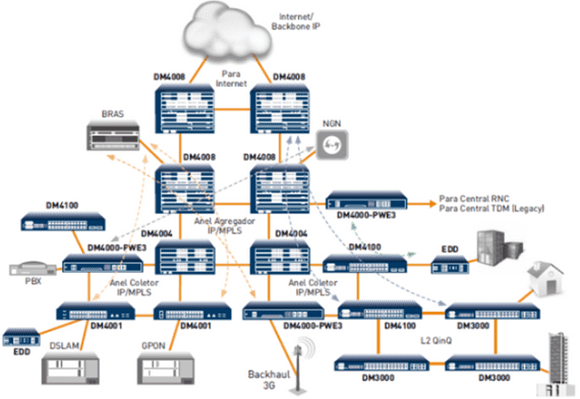The DM4100 family offers a wide range of wire speed switches supporting Gigabit and 10Gigabit Ethernet interfaces. With versions providing Gigabit Ethernet ports on SFP modules or copper interfaces, it also has models with stacking and full PoE+ support. All product versions are 1U high and compatible with 19" racks.
Wire Speed L2, L3 and MPLS
The DM4100 family supports wire speed L2, L3 and MPLS packet forwarding through a hardware-based internal switch fabric of up to 224 Gbit/s.
Management
Centralized management is provided through DMView NMS over Windows™ or Solaris™ platforms, supporting FCAPS model and redundancy. The equipment also provides Command Line Interface (CLI) with automatic syntax help, which is accessible by either Telnet or Console RS-232. SNMPv1, v2c and v3 and 4 RMON groups are supported.
It is possible to keep up to 2 firmwares and 10 different configuration profiles simultaneously, choosing which one will be loaded during the equipment initialization.
Security
To guarantee the network security, all switches from DM4100 family allow a reliable management structure through user authentication, authorization and accounting via RADIUS and TACACS+. They also support alarms notifications, a unique clock via SNTP, protection against Denial of Service (DoS/DDoS) and Syslog (remote and local). DM4100 family also offer mechanisms of protection against broadcast, multicast and Destination Lookup Failure (DLF).
VLANs
Virtual LANs are fully supported on DM4100 family, allowing the usage of 4.094 VLANs simultaneously, according to IEEE 802.1q. Double tagging (Q-in-Q) is also supported, allowing the support of Transparent LAN Services (TLS). It is also supported Protocol-based, MAC-based VLANs and Port-based VLAN with overlapping.
IP/MPLS networks
The DM4100 family implements static and dynamic routing (RIPv2, OSPFv2/v3 e BGPv4) as well as the roles of Label Edge Router (LER) and Label Switching Router (LSR) within MPLS networks. Transparent LAN Services (TLS) are implemented through L2 VPN over MPLS. VPNs are supported in point-to-point (VPWS) and point-to-multipoint (VPLS or H-VPLS).
QoS
All the DM4100 models offer 8 queues per physical port, supporting advanced scheduling algorithms which can assure that determined flow is always prioritized accordingly. The products also allow the configuration of queue weights and the maximum allowed forwarding rate for all physical ports. The traffic classification is done according to IEEE 802.1p standard, IP Precedence field, DSCP and TCP or UDP ports. QoS statistics are also provided, allowing full network traffic visibility.
The traffic shaping mechanism provides a granularity of 8kbit/s for Committed Information Rate (CIR) and Peak Information Rate (PIR), and can be applied to either incoming or outgoing traffic.
Ethernet OAM
The DM4100 family supports OAM EFM according IEEE 802.3ah. This allows fault indication, Unidirectional Link e Critical Event. EFM operates with configurable PDU intervals, keeping full interoperability with other equipment vendors.
Additionally this family also support OAM CFM according IEEE 802.1ag and ITU-T Y.1731. Proactive monitoring, continuity check messages and fault isolation through loopback and link trace messages are supported.
Protection Mechanisms
Spanning Tree, including RSTP for shorter convergence times and MSTP for better resource allocation and improved scalability are fully supported, as well as EAPS and ERPS protocols for ring topologies. This allows DM4100 models to be part of Metro Ethernet scenarios supporting automatic protection switching and providing faster service restoration times.
Additionally Link Aggregation static and dynamic (LAG and LACP) are also supported.
Power over Ethernet
The DM4100 family has versions with IEEE 802.3at (PoE+) which can provide up to 32.4W per port (class 4), allowing the products to feed and communicate to remote devices using the same infrastructure (Cat.5e or 6 cables).
The great variety of DM4100 models with Gigabit and 10Gigabit Ethernet on SFP/SFP+/XFP cages combined with stacking, L3 and MPLS support, helps the building of FTTx networks and allows the use of a wide range optical modules according to node usage, fiber cords, distances and rates required. The DM4100 family also offers protection protocols which allows the building of robust and redundant topologies like optical rings.
Additionally the DM4100 family has models which can be part of very complex Metro Ethernet L2, L3 and MPLS networks.

The DM4100 models with Power Over Ethernet (PoE) support, including PoE+, can be used for feeding remote devices like security cameras, wireless routers or IP phones.
